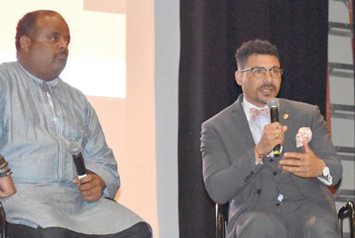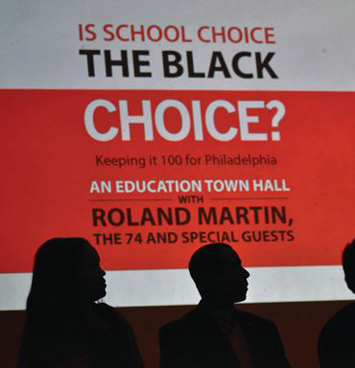School choice town hall debates Black control of charter schools
By Michael Z. Muhammad -Contributing Writer- | Last updated: Jun 12, 2019 - 10:42:04 AMWhat's your opinion on this article?
PHILADELPHIA—Mastery Charter School-Shoemaker Campus in Philadelphia recently hosted a wide-ranging conversation about Black school choice led by noted journalist Roland S. Martin and included a stellar panel of Black educators. The discussion in a town hall format included the politics of school choice, Philadelphia’s Black-White achievement gap, and parent empowerment among other topics.

Journalist Roland Martin (left) and educator Dr. Steve Perry discuss charter school education for Black children at a May 29 town hall, “Is School Choice the Black Choice?” held at the Mastery Charter School in Philadelphia. It was the third stop on a nationwide tour. Photos: Michael Z. Muhammad
|
The tone for the May 29 discussion was set when Hilary Beard, writer, and researcher in her introduction challenged the audience to “be brave enough to try something new.” The “new” turned out to be self-determination.
The two hours plus event marked the third education town hall in a national series meant to engage Black families on issues of student achievement, parent involvement, and classroom equity, according to organizers. The town hall was sponsored by Mr. Martin and The 74 and started in Indianapolis in December 2018 and will take place in various cities across the country through 2020. The 74 is a nonprofit digital news site covering education in America.
The event was titled, “Is School Choice the Black Choice?” Mr. Martin hosted onstage: Jessica Cunningham Akoto, CEO of KIPP Philadelphia; Bryan Carter, CEO and president of Gesu School; Christina Grant, chief of charter schools and innovation at the School District of Philadelphia; Sharif El-Mekki, principal at Mastery Charter School-Shoemaker Campus; Toya Algarin, a member of the board of trustees for KIPP Philadelphia; David Hardy, executive director of Excellent Schools PA; and Lenny McAllister, director of Western Pennsylvania Commonwealth Foundation.
“The majority of kids in public schools today are Black and Brown, and you have an education reform movement that is too White,” Mr. Martin said. “African Americans want to also see us in control of schools, in control of curriculum, in control of the budgets, in control of the hiring.”
During an interview with The Final Call, Mr. Martin buttressed his belief that Black people must take complete control of their education. “You don’t have the opportunity to open private schools so the alternative is charter schools where you can control the curriculum, economics, who gets hired and who the teachers are. That is exactly what we are trying to do” Mr. Martin explained.
However not all think charters schools are the way to go and argue that charter schools take money and resources from public schools. However, charter school proponents state public schools have fallen short, particularly when it comes to properly educating Black and Latino students. Supporters also argue that parents should have the ultimate say-so in the type of education they want for their children. In the past, organizations like the NAACP and Movement for Black Lives have called for a moratorium on charter schools based on a number of factors including that those schools be subject to the same accountability and transparence as public schools. Just as with public schools, there are questions as to how well charters educate Black children.
“This town hall meeting is getting Black people to understand the reality behind charter schools and the opportunity that exists for us to control the schools and thus controlling the education and economics of our communities. Most people have no clue about charter schools. They don’t even know they are public schools. We need more Black-run, Black-managed charter schools,” said Mr. Martin.

The “Is School Choice the Black Choice?” is sponsored by journalist Roland Martin and The 74, a nonprofit educational news site.
|
The robust panel discussion highlighted the need for existing Black run charter schools to form alliances, the need for capital growth, viable board membership that can assist school growth, and ecosystem construction. In Philadelphia, it was pointed out that there are 87 charter schools in the city across 103 campuses, and only five are Black administrated.
In terms of growing the Black Charter school movement, the panel recommended the need for leadership, climate change, advocacy (political) and talent growth. The need was also pointed out to educate parents and that children must be involved in the process. Schools must inform parents with what’s going right and wrong in the school, panelists noted.
Jacqueline Barnett, former secretary of education for the city of Philadelphia under the Street administration attended the townhall. She told The Final Call she was concerned about how we are going to educate our next generation of young people.
“I think the premise that was presented here tonight was bold,” Ms. Barnett said. “At some point, you have to call a thing a thing as the kids say. If this is going to be about Black children, then let’s call it that. The data is compelling. The data around mass incarceration is around Black males. They don’t start in prison so we must address where they start, and that’s the educational system,” she added.
“I’m an advocate of parental choice. I’m an advocate of quality choice. I am also a staunch advocate for quality schools where people live,” Principal El-Mekki told The Final Call. “It’s all of our responsibility to make sure we are providing great choices,” he added.
Dr. Perry, founder of the successful Capital Preparatory Schools, participated in a discussion with Mr. Martin during the town hall.
“At the current rate of academic performance, it will take African Americans 287 years to catch up,” said Mr. Perry during his discussion on the plight of Black education in America.
At issue during the discussion was misinformation concerning charters versus traditional public schools. “Which is why we can’t get caught up in the silly fight about charters or whatnot,” Mr. Martin stated.
“The fight between charters and non-charters is a red herring; it’s a straight jobs issue— more specifically, it’s about teachers unions 100 percent and the weak politicians who listen to them,” Mr. Perry argued.
“One of the biggest chasms that exist for us around education reform is the chasm in the Black community,” he added. “What’s strange is many African Americans, who are middle-class, think just because they’re middle-class, they’re no longer as Black as the other people. We have to recognize that within our community when we’re talking six percent of African American children were deemed college ready by [the ACT], we’re talking about all Black people, not just the poor ones. … African American children, by and large, are being beaten in the classroom by poor White children and immigrants who come in not speaking English,” said Dr. Perry.
Dr. Perry informed the audience of about 150 people that Black folks must get strategic. “Is enough enough yet?” he asked. “We must have conversations that turn into action,” he added. Mr. Martin pointed out that while White people control the money Blacks have been turned into “educational sharecroppers.”
“There is a direct line from school to prison, and Black children are the new cotton,” said Mr. Martin.
Mr. Martin and Dr. Perry also discussed the premise that Black children learn best from Black instruction. “It is not segregation if we choose to attend our schools,” Mr. Martin said. He went on to lament; it’s like a “bunch of Black people afraid of being for Black people.”
Their discussion pointed out that the academic stagnation currently in public schools that resulted in Black male students failing to learn beyond the fifth grade. No child is born broken, said Dr. Perry.
“Schools are amazing at breaking them,” he added. Dr. Perry pointed to a recent statistic by the U.S. Department of Education’s Office of Civil Rights which showed that Black children represented 18 percent of public preschool enrollment, but 48 percent of preschoolers receiving multiple out-of-school suspensions. He called the statistic, “unconscionable.”
“It doesn’t have to be that way. We must run our schools,” said Dr. Perry. He concluded that the current U.S. educational system is designed to aggressively attack Black children, and that it is “no accident.”
(Final Call staff contributed to this report.)
INSIDE STORIES AND REVIEWS
-
-
About Harriett ... and the Negro Hollywood Road Show
By Rabiah Muhammad, Guest Columnist » Full Story -
Skepticism greets Jay-Z, NFL talk of inspiring change
By Bryan 18X Crawford and Richard B. Muhammad The Final Call Newspaper @TheFinalCall » Full Story -
The painful problem of Black girls and suicide
By Charlene Muhammad -National Correspondent- » Full Story -
Exploitation of Innocence - Report: Perceptions, policies hurting Black girls
By Charlene Muhammad -National Correspondent- » Full Story -
Big Ballin: Big ideas fuel a father’s Big Baller Brand and brash business sense
By Bryan Crawford -Contributing Writer- » Full Story






 Click Here Stay Connected!
Click Here Stay Connected!








